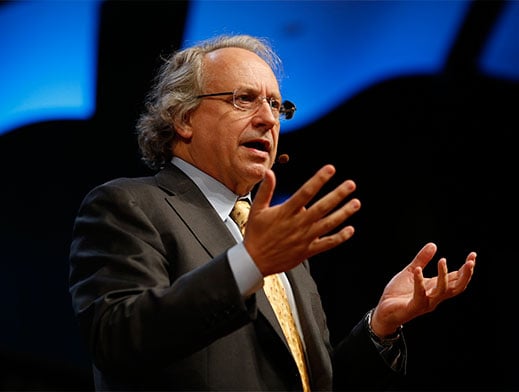Can We Shape the Robot Revolution?
New technologies are poised to have a profound impact on employment and society, robotics pioneer Rodney Brooks warned on Monday at Solve, a conference being held this week at MIT.

Brooks, a professor emeritus at MIT and one of the cofounders of the robotics company iRobot, said rapid advances threaten to upset many areas of work in the coming decades (see “Who Will Own the Robots?”). “We see a common theme right now,” Brooks said, “which is digital technology changing the nature of work.”
Robotics is already playing a role in a major employment shift in manufacturing, in fact. Safer, cheaper, and smarter robots could foster a shift in employment in countries such as China in the coming years, as rising wages enable people to move from manufacturing to other kinds of employment. Brooks founded a company called Rethink Robotics that is making a robot designed to take over tasks currently done by hand on manufacturing lines (see “Rethinking the Manufacturing Robot”).
During Solve, high-profile scientists and business leaders will consider trends that could affect the ability of millions of people to find meaningful employment. Sessions aimed at addressing the issue will include academics such as Erik Brynjolfsson, who has researched the issue of digital innovations and employment, and Eric Schmidt, chairman of Alphabet (the company previously known as Google).
Brooks compared the broader coming technological shift to the invention of the cotton gin—a device for automating the process of separating cotton fibers from seeds.
“It meant one person could produce 50 pounds of cotton per day instead of one pound,” Brooks said. “That made cotton a worldwide export business in the U.S., and it has been well argued that without the invention of the cotton gin we never would have had the civil war, and slavery would have died out much earlier.”
Brooks admitted he was sometimes guilty of focusing on technological innovation rather than its social implications himself. But he added that it was increasingly clear that this needs to be part of the debate. “Technological innovations can have severe impacts on society,” he said.
Keep Reading
Most Popular
Large language models can do jaw-dropping things. But nobody knows exactly why.
And that's a problem. Figuring it out is one of the biggest scientific puzzles of our time and a crucial step towards controlling more powerful future models.
The problem with plug-in hybrids? Their drivers.
Plug-in hybrids are often sold as a transition to EVs, but new data from Europe shows we’re still underestimating the emissions they produce.
Google DeepMind’s new generative model makes Super Mario–like games from scratch
Genie learns how to control games by watching hours and hours of video. It could help train next-gen robots too.
How scientists traced a mysterious covid case back to six toilets
When wastewater surveillance turns into a hunt for a single infected individual, the ethics get tricky.
Stay connected
Get the latest updates from
MIT Technology Review
Discover special offers, top stories, upcoming events, and more.